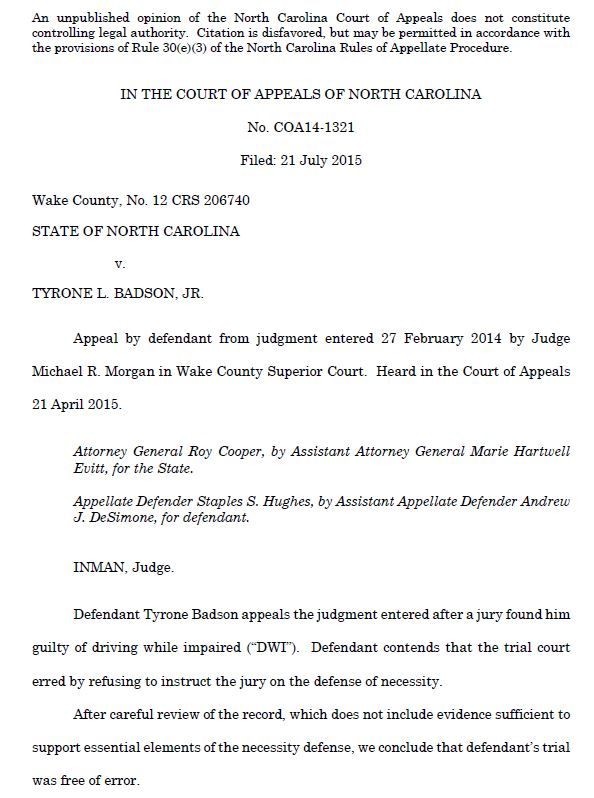Common Law – Duress Necessity DWI Defenses in North Carolina
Part I – Defendant is not required to give notice of the affirmative defense of duress or necessity in DISTRICT COURT APPEALS
- “Discovery in the Superior Court” under Article 48 of the North Carolina General Statutes applies only to cases within the Superior Court’s original jurisdiction
- Where the District Court has original jurisdiction, including Misdemeanor DWI cases, discovery statutes do not apply
- Section 15A-905(c) (2013) sets forth Defendant must provide the State with notice of its intent to seek the defense of, among other things, duress
- Section 15A-905 is under Article 48, which is referenced as “Discovery in the Superior Court”
- UNPUBLISHED DECISION
Although the defenses of duress and necessity were “historically distinguished” under common law, “[M]odern cases have tended to blur the distinction[.]” State v. Monroe, __ N.C. App. __, __, 756 S.E.2d 376, 378 (2014).
Duress Necessity DWI Defenses are under the Common Law. North Carolina Pattern Jury Instruction 310.10.
There is evidence in this case tending to show that the defendant acted only because of [compulsion] [duress] [coercion]. The burden of proving [compulsion] [duress] [coercion] is upon the defendant. It need not be proved beyond a reasonable doubt, but only to your satisfaction. The defendant would not be guilty of this crime if his actions were caused by a reasonable fear that he (or another) would suffer immediate death or serious bodily injury if he did not commit the crime. His assertion of [compulsion] [duress] [coercion] is a denial that he committed any crime. The burden remains on the State to prove the defendant’s guilt beyond a reasonable doubt.
In criminal law, an affirmative defense is sometimes called a justification or excuse defense.[2] Consequently, affirmative defenses limit or excuse a defendant’s criminal culpability
In that DWI cases are not within the original jurisdiction of the Superior Court, and therefore not subject to reciprocal sharing of information as part of Discovery under Article 48, said rules are inapplicable.
While Taken in a Light Most Favorable to Defendant, traditional requirements of making the prima facie case for an instruction to the jury remain. The Standard of Proof is to the “jury’s satisfaction” and is not Beyond a Reasonable Doubt.
See Also: State v. Fuller, 176 N.C. App. 104, 108, 626 S.E.2d 655, 657 (2006).
Part II – Prima Facie Elements – “In a Light Most Favorable to the Defendant”
- Defense of necessity is available in a DWI prosecution – Hudgins, 167 N.C. App. at 710
- Defendant must prove three elements to establish the defense of necessity: (1) reasonable action, (2) taken to protect life, limb, or health of a person, and (3) no other acceptable choices available
- Coercion or Duress must be Present, Imminent or Impending
- Of such a nature as to induce a well-grounded apprehension of death or serious bodily harm if the act is not done
- Defendant must present some credible evidence on every element of the defense
- Cannot be invoked as an excuse by one who had a reasonable opportunity to avoid doing the act without undue exposure to death or serious bodily harm
- Evidence must be viewed in a light most favorable to the defendant
Part III – Unique Factual History
Wake County prosecution for Impaired Driving. Single car collision with evidence of gross impairment (.18 BrAc). Accused, whom recently moved to Raleigh area, alleges he visited local pool hall and consumed “a few drinks.” Thereafter he became ill. A fellow patron, with whom Defendant was playing pool, offered to drive Mr. Badson’s vehicle home as, “Defendant was reluctant to leave his car at the pool hall.”
During the ride home Mr. Badson testified he became increasingly ill and fell asleep. At some point thereafter he woke to unfamiliar surroundings. Driver of vehicle told Mr. Badson to “just chill” and began touching his leg. An argument and physical altercation ensued outside the vehicle, during which Mr. Badson was pepper-sprayed. Mr. Badson gained control of the car, locking the acquaintance out and drove away because he was, “scared of what was going to happen to [him].”
Raleigh Police Officer dispatched to investigate single car MVA. Caller advised there was a “black male rolling around on the ground beside his car” and what appeared to be substantial damage to the vehicle.
Officer reported Mr. Badson’s eyes were “pretty swollen” and that he had “mucus or snot” all over his nose and face. As a result, Defendant was transported to local fire station to wash away pepper spray. Officer noted “heavy front end damage,” that the vehicle swerved toward the Officer and that he saw Mr. Badson sitting up against the steering wheel, attempting to keep his eyes open to drive.
Mr. Badson told the officer, “I’ve been sprayed.” There was an orange spot on his shirt which was consistent with pepper spray in the Officer’s training and experience. The officer “started coughing,” determining Mr. Badson had indeed been sprayed with pepper spray.
Mr. Badson advised he had been pepper-sprayed because he would not consent to sexual activity with the male acquaintance from the pool hall.
Location of the vehicle upon stop was approximately four or five miles from the pool hall. Defendant had substantial lapses in his memory, not recalling the circumstances of the wreck and damage to his vehicle. No other persons were found in vicinity.
Examination of interior of vehicle indicated, per Officer opinion, pepper-spray incident took place inside the vehicle, while Mr. Badson was in the driver’s seat. 911 Caller did not make mention of secondary party.
Ruling, Key Quotes:
Here, while the evidence supports a finding that defendant had ‘reasonable grounds to fear for his safety,’ State v. Brown, 182 N.C. App. 115, 119, 646 S.E.2d 775, 778 (2007), based on the undisputed evidence showing that some sort of altercation had occurred that resulted in defendant being rendered almost incapacitated after being pepper sprayed, defendant offered no evidence showing that his actions were reasonable, that there were no reasonable alternatives, or that defendant was still ‘justifiably fearful,’ Cooke, 94 N.C. App. at 387, 380 S.E.2d at 382, at the time he was stopped because it is unclear how far (in distance or time) defendant drove after the altercation ended
In sum, even construing the evidence in a light most favorable to defendant, defendant still has the burden of providing credible evidence on every element of the defense of necessity in order to be entitled to the instruction. Sanders, 201 N.C. App. at 635, 687 S.E.2d at 535. Without some testimony to support a conclusion that defendant drove only as far as necessary to get out of harm’s way and seek help, defendant has failed to meet his burden, and defendant was not entitled to the instruction at trial
 Carolina Law Blog
Carolina Law Blog
